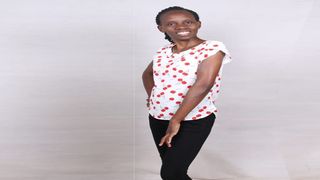
Purity Ireri is a certified nurse and midwife at Embu Level Five hospital. Photo | Pool
Saturday Magazine
Premium
I am a young midwife, and I think we need to start talking about sex openly
What you need to know:
- Purity Ireri, 28, is a certified young nurse-midwife at Embu Level five hospital. Before getting into the career, she had to use euphemisms to refer to a woman's private parts
- It was a big problem, and she had to disassociate from the shame of calling things as they are. She talks about her work and why she thinks sex education will avert teenage pregnancies
"The first time I mentioned the word vagina aloud, I felt embarrassed and like I owed someone an apology. I wondered what my mother would make of my lack of manners. I was brought up by conservative parents and in a society that insisted on substitute names for our private parts. The euphemism for a vagina would be 'that' instead of the actual word.
On that day, I was in a session for my Diploma course in community health nursing. Part of the instructions by our various tutors was that in the medical field, there is no beating around the bush when it comes to names.
To show you how the course and later the career was pulling me from an abyss of naivety, I didn't know that there was more to midwifery than helping a mother bring a baby into the world. The support part, before labour, throughout, and after is something that most outsiders don't get to hear. As a midwife, I am obliged to watch the drama in the labour ward, share in the parents-to-be joys and carry their pain.
I was barely 20 when I was ushered into the birthing room and chaperoned to perform my first child birthing process. Then, I was still a student and was at the hospital for an internship. Other interns had shared tales of the wards so I went there scared of the blood. I would soon realise that this shouldn't have been my only worry. Sometimes, there's poop too.
During those days, the mess was quite a bother seeing that it was a new experience for me. Now, it's not something I think about. Maybe it is because of other things that happen in the labour ward, like the emotions that come with childbirth. I have seen women cry or laugh hysterically after holding their babies. It is the most beautiful moment to witness and these times are my reservoir of hope and joy when sad.
Flip the coin. There are bad days. Losing a woman or a baby after complications during what should be a routine procedure is devastating. While a part of you is mourning with the bereaved and thinking of the moments that you shared with the deceased, there's another that is seeking your audience. At that moment, you agonise, 'did you do enough to save her?'
Social media hate
While doing the usual scrolling on my Facebook timeline a while back, I came across a photo shared by a midwife detailing her profession. The post had elicited dozens of comments so I decided to read through. I was taken aback when I realised that most of the respondents were actually hating on us, midwives. Some said we are rude others concluded that we are inconsiderate, have anger issues and we were accorded all manner of negative labeling. While there are some in the profession with such traits, I think that it is mostly the expecting women that don't want to build a rapport. For instance, if a woman crosses her legs during the birthing process, what do you do? I am obligated to safeguard her life and that of the baby. But you know what's interesting, when I became pregnant with my firstborn son and went to the hospital, the experience was like that of a new mother. I had the same fears, asked almost similar questions but borrowing from my own experience followed instructions.
I currently work at Embu Level five hospital where I get to deliver at least three babies into the world. Sometimes, I do this alone. What this has done is erase naivety and shyness around matters of sex education and our body parts. When I talk to my nieces and nephews, I don't tell them that having sex will automatically get them pregnant. That is passing down the wrong narrative. I explain what sex is, how it happens and how to prevent pregnancy and sexually transmitted diseases.
One of the issues that touch me is that of teenage pregnancies which have been on the rise. Last year, in three months, 152,000 Kenyan teenage girls became pregnant. I have attended to such young-to-be mothers and discovered that some had no absolute idea that they were pregnant and some who did, didn't know how to talk about it. Why? Because as a society, we are hush around the subject of sex, or when we talk about it, we don't say it as it is. I am trying to change this narrative.
Being a midwife has shaped me into a listener and a counselor because of what our roles entail and the fact that every day is different from the other. Sometimes, I am handling mothers in their first stages of labour in the morning shift, and in the afternoon, I am attending to those who are almost due and by the night I am delivering babies. I remember when I started dating my husband, I had to explain about my erratic schedules because I have heard some of my colleagues say that their partners left because they couldn't deal with their many nights away from home. The good thing is that he understood and supported me."
For feedback to the editor write to [email protected]





